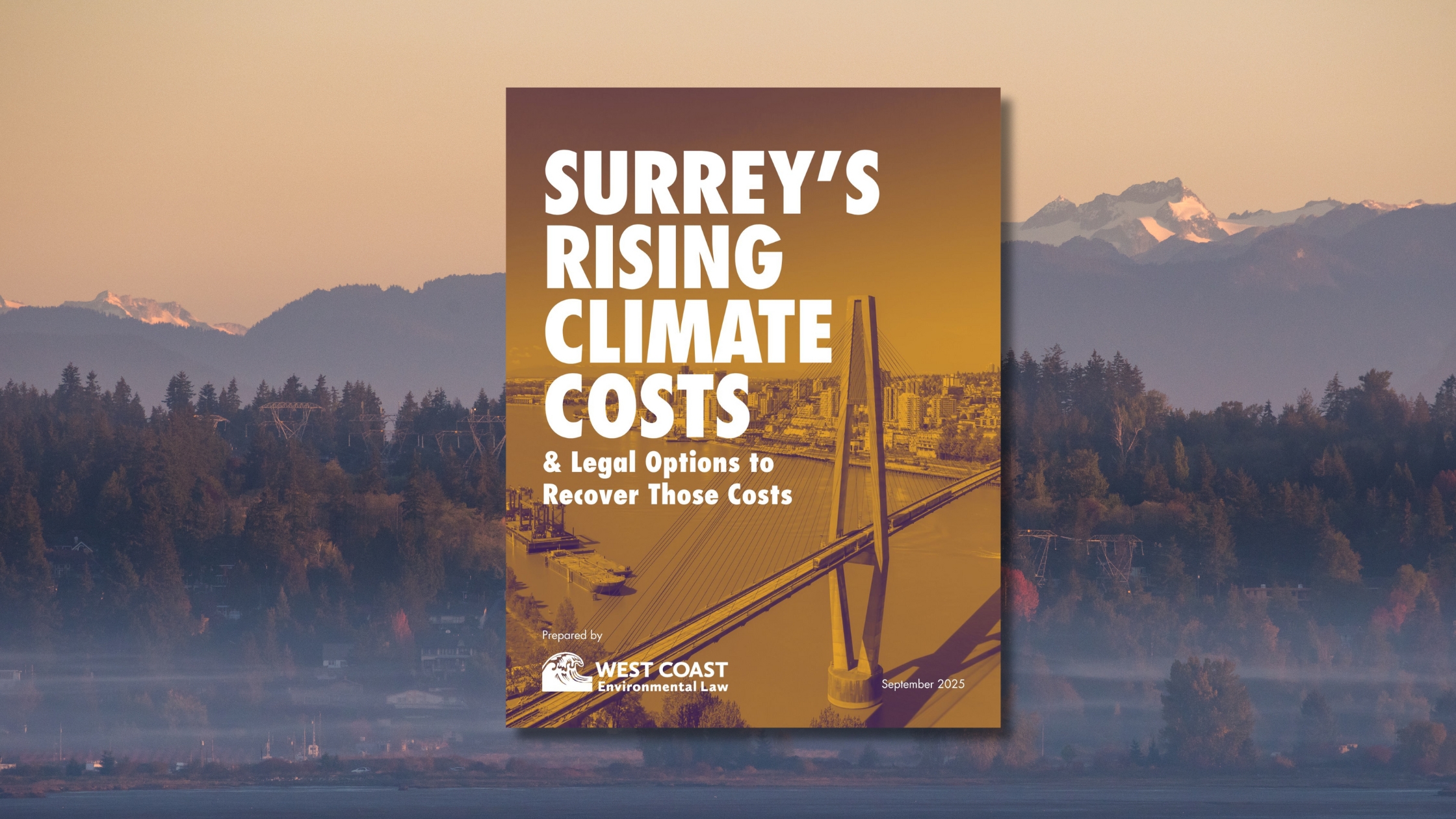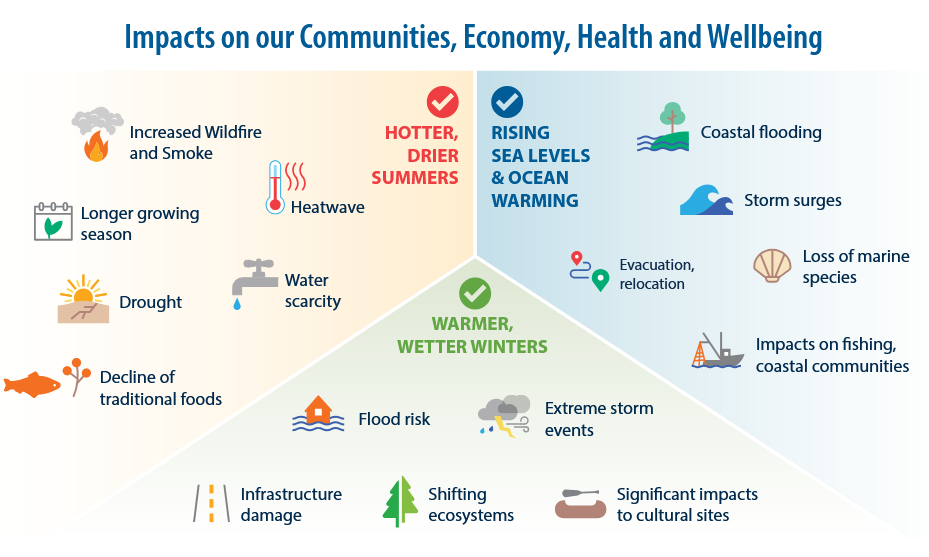
We trust our governments to make decisions for us, including making investments now that will keep our communities safe tomorrow. But, as I found when I recently wrote a report for the City of Surrey, climate change upends all the assumptions on which our communities were built, leaving governments facing expensive upgrades and unknown risks.
My findings raise troubling questions for residents of Surrey about how much the City needs to pay to keep residents safe, and whether those costs will be borne entirely by taxpayers.
Surrey is not alone in facing these costs. Residents of all other BC communities should be asking similar questions of their own local governments, as well as the federal and provincial governments. Climate change is in many ways a financial crisis, one that is already downloading massive costs onto taxpayers so that a relatively small number of fossil fuel companies and their investors can continue to make insane profits.
We were invited by Surrey to write a report
On December 2nd, 2024 Surrey residents who volunteer with West Coast Environmental Law and the Sue Big Oil campaign applied to appear before Surrey Council as a delegation. But instead of hearing the delegation, Mayor and Council invited West Coast Environmental Law to provide a written report to Surrey staff on why the city should look at legal options to recover its climate costs from fossil fuel companies.
Earlier this year, we delivered a draft report to Surrey staff that includes a detailed discussion of the city’s climate costs. You can’t explain why Surrey should consider legal action to recover climate costs without making it clear what some of those climate costs are. And once you understand what they are, it’s difficult to see why fossil fuel companies that contribute to climate change shouldn’t at least share in those costs.
Our report is based on publicly-available information and includes references and more detailed discussion of how we reached our conclusions. We also made several requests to Surrey staff to meet to review the information and our conclusions and to ensure that it answers any questions that staff or Council have. However, we did not receive a response to those requests. Our report, including the excerpt below, was sent to Surrey Council and staff “as-is” on September 5th.
Report Excerpt
Here’s a brief excerpt of our report to Surrey. Please see the full report for more detail.
It’s unfair for communities and local governments to grapple alone with … rising [climate] costs, resulting in potentially tough decisions about balancing increased climate risks with increased taxes or reduced levels of service. The fossil fuel industry, due to its out-sized role in causing the climate crisis, must bear at least some responsibility.
Facing these realities, over 70 local and state governments in the U.S. and others around the world are now suing major polluters for a share of local climate costs. Eleven BC municipalities have pledged to work together towards a class action to help pay for local climate costs, while staff in other municipalities are engaged in inter-governmental discussions about the logistics of this type of legal action. Surrey has the opportunity to join them.
Surrey’s Climate Costs
From the perspective of a local government, the argument for taking legal action to recover climate costs is grounded in the magnitude of those costs, as well as the dual legal obligations of Councillors and Staff to keep residents and properties in the City safe from increased climate impacts and to manage taxpayers’ dollars responsibly.
Surrey is not alone in incurring considerable costs due to climate change. Local governments own and maintain 60% of public infrastructure, all of which was designed to withstand a range of expected weather and other conditions. With extreme storms, droughts, wildfires and heat events happening more frequently, this infrastructure is increasingly overwhelmed.
The Insurance Bureau of Canada and Federation of Canadian Municipalities estimate that Canadian local governments collectively need to spend about $5.3 billion annually to prepare for climate impacts. Neglecting to pay these costs will lead to even higher climate costs down the road.
The following figure (from BC’s Climate Adaptation and Preparedness Strategy) shows some of the climate change impacts facing BC communities, almost all of which apply to some degree to Surrey.

Surrey staff have access to more detailed information about how climate change will affect the City, and the climate adaptation, mitigation and loss and damage costs being incurred (or which could be incurred) as a result of climate change. However, Surrey residents have reason to be concerned about the huge costs from climate change facing the City and their implications for Surrey’s budget, based on publicly available information. Appendix A summarizes our review of the publicly available information about some of the major climate costs facing Surrey, and asks staff a number of questions intended to clarify and quantify these costs. This information is briefly summarized in the following table.
| Category of Impact | Description | Dollar Value (if known) |
| Sea level rise – coastal flooding | Surrey has significant areas that are at or near sea level, and extensive coastal defenses. In addition, stormwater systems have outfalls at sea level. Surrey’s Coastal Flood Adaptation Strategy (See page 66) indicates that the City should be spending $20 million per year for the current decade. While the Strategy leaves questions about the overall cost for this work in the coming decades unanswered, it is likely that these costs exceed $1.5 billion, probably by a significant amount. | $20 million per year of expenditures from 2020-2030, and more than $1.5 billion between now and 2100. |
| Extreme storm events/infrastructure damage | Surrey has an extensive network of stormwater infrastructure, much of which will need to be upgraded to accommodate higher levels of winter precipitation. Despite recommendations made in several of Surrey’s Integrated Stormwater Management Plans (ISMPs) to address climate change in the design guidance, the City’s Design Criteria Manual does not appear to explicitly address climate change, raising questions about future liability. However, a study conducted for Metro Vancouver and some ISMPs evaluate the impact of increased precipitation due to climate change on drainage, making various recommendations about how to address the increased costs. | Significant increases in the tens of million of dollars already spent on stormwater management – possibly as much as a 2-3x increase in costs for some upgrades of drainage infrastructure based on 2050 IDF curves [Intensity-Duration-Frequency Flood Data]. |
| Heat death prevention | 75 deaths occurred in Surrey in 2021 due to the Heat Dome and Surrey has identified a wide range of programs, services and infrastructure which are required to protect against future heat waves. Unfortunately, the cost of this work, and how the expenses might be shared with the Province, has not been publicly released. | Insufficient data. |
| Urban forest | The replacement cost of the entire urban forest in Surrey would be about $3.7 billion, of which 42% relates to public lands. Urban forests typically have a mortality rate of about 2.5% among trees older than five years, and an academic study found that the tree mortality rate in the Pacific Northwest is doubling every 17 years. | Potentially millions of dollars annually. |
| Fire risk | Rising temperatures, summer dryness, tree mortality and other factors are dramatically increasing the risks of urban fires. We have recently seen the possible consequences of urban conflagration in L.A. and experts warn that similar fires could occur in BC urban centres. Commitments to implement Surrey’s wildfire community protection plan, and to increase public education around fire safety, and also incremental increases in firefighting costs, are all required as a result of climate change. | Insufficient data. |
As the above table, and Appendix A, demonstrate, the climate costs that Surrey is already experiencing are considerable, running into the tens of millions of dollars every year, and over time expected to run into the billions of dollars. This is not a comprehensive list of those costs, and Surrey Staff may be able to answer some or all of the questions found in Appendix A and better quantify those costs and the billions of dollars facing the City in the coming decades.
Surrey’s current expenditures (or identified costs) appear to be in a similar order of magnitude to, and possibly more than, the $50 million per year that the City of Vancouver is currently spending on climate resilience and disaster relief. Failure to spend these funds puts Surrey residents and the City at risk of massive losses and damages (potentially in the many billions of dollars), and may open up the municipality to liability from people whose rights are compromised due to the failure of municipal infrastructure.
Surrey’s climate costs are currently being passed on to taxpayers, either directly in taxes or indirectly in increased risks. It is clear that Surrey has much to gain from any legal action that could help secure compensation from global fossil fuel companies, including the certainty that would come from a court decision or settlement.
Legal Options to Secure Climate Compensation
Local governments have a duty, as part of their fiscal responsibilities, to take reasonable steps to recover municipal costs that are incurred due to the irresponsible actions of others. Local governments often sue parties that have damaged municipal infrastructure or caused it to incur costs. Similarly, it would be fiscally irresponsible to pass climate costs onto taxpayers without trying to recover a share of those costs from those that have done the most to cause climate change.
If Surrey accepts that it has massive, realized, hidden and emerging climate costs, then the question is who should pay for them, and whether the burden should be borne entirely by taxpayers. Surrey’s climate costs may be partly addressed by federal and provincial government funding and assistance, but in recent years, there has been growing demand from climate-affected and vulnerable communities across BC and Canada. Recently the Canadian government has turned down funding applications from Surrey for coastal flood measures, as well as for flood prevention from flood-impacted Abbotsford, Merritt and Princeton, underscoring that funds from federal and provincial governments are not guaranteed. And of course, even with this funding, it is still taxpayers who are ultimately paying.
In the same way that governments have looked to hold tobacco, opioid and other manufacturers responsible for a share of the public costs associated with harms caused by their products, BC local governments can and should look to global fossil fuel companies for a proportionate share of their communities’ climate costs. This is not to say that fossil fuel companies alone are responsible for the climate crisis, only that they should pay a fair share proportionate to the harm they’ve caused.
Conclusion
We invite Surrey residents and British Columbians to read the whole report to understand more about how climate change is driving up municipal costs and increasing our taxes. And if you have not done so already, please sign the Sue Big Oil declaration to make it clear: fossil fuel companies should be paying their fair share of those costs.